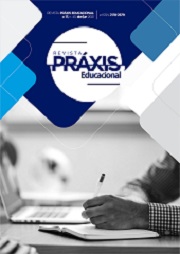Keys in building knowledge of inclusive education
DOI:
https://doi.org/10.22481/praxisedu.v17i45.8140Keywords:
knowledge construction, inclusive education, diasporism, transpositions, genealogical , entanglements, defining problemsAbstract
the theory of inclusive education by making explicit an open nature requires thinking about what it does in the world and how it solves certain problems, trying to visualize on what other things its work articulates. Inclusive education, not belonging exactly to the regionalization signified as special education, reaffirms that its defining contours have been established through a set of misunderstandings of approximation to the term itself. The objective of this work is to analyze some of its heuristic premises to understand its mechanisms of knowledge production. The method used is the critical documentary review. Among its main conclusions, the work identifies that the knowledge structure of what we call inclusive education is made up of a diversity of voices that contribute to the understanding of various topics and links with the various structures of the world and their systems, demanding the adoption of new methods for problems that cannot be understood under the conservative purism of methodological work. The territories of the inclusive construct a neo-materialist epistemology.
Downloads
Metrics
References
ANG-LYGATE, Magdalene. (2008). “Trazar los espacios de deslocalización. De la teorización a la diáspora”, en: FABARDO, Mercedes. (Edit.). Feminismos negros. Una antología. (pp.291-314). Madrid: Traficantes de Sueños.
ANTHIAS, Floya. (1998). Rethinking Social Divisions: Some Notes Towards a Theoretical Framework. Sociological Review, 46(3), 505-535.
BRAH, Avtar. (2011). Cartografías de la diáspora. Identidades en cuestión. Madrid: Traficantes de Sueños.
BRAIDOTTI, Rosi. (2009). Transposiciones. Barcelona: Gedisa.
BRAIDOTTI, Rosi. (2013). Feminismo, diferencia sexual y subjetividad nómade. Barcelona: Gedisa.
BRAIDOTTI, Rosi. (2020). Sujetos nómades. Buenos Aires: Paidós.
CULLER, Jonathan. (2009). Structuralist Poetics. Structuralism, linguistics and the study of literature. London: Routledge & Kegan Pau.
DAVIS, Kathy. (2014). “Intersectionality as a Critical Mathodology”; en: LYKKE, N. (Ed.) Writing Academic Texts Differently: Intersectional Feminist Methodologies and the Playful Art of Writing. (pp. 268-281). New York: Routledge.
GONZÁLEZ, Brais. (2018). La ética diferencial de Rosi Braidotti. Agora. Papeles de filosofia, 37(2), 173-191.
DELEUZE, G. & GUATTARI, F. (1970). La lógica de sentido. Barcelona: Edit. Six Barral.
GUATTARI, Félix. (1992). Las tres ecologías. México: FCE.
KYROLE, Katarina, KOIVUNEN, Anu & RYBERG, Ingrid. (2019). Vulnerability as political language. Recuperado el 24 de junio de 2020: https://www.manchesteropenhive.com/view/9781526133113/9781526133113.00005.xml
LUZT, Helma. (2001). Intersectionality as. DiGeSt. Journal of Diversity and Gender Studies, Vol. 2, No. 1-2 (2015), pp. 39-44.
MASSEY, Doreen (1994). Space, Place and Gender. London: Routledge
OCAMPO, Aldo. (2016). “Gramática de la Educación Inclusiva: ejes críticos para cartografiar sus condiciones de producción y funcionamiento epistémico”, en: Ocampo, A. (Comp.). Ideología, discapacidad y dominación: los imaginarios constitutivos de la discapacidad en Latinoamérica. (73-159 pp.). Santiago: Fondo Editorial CELEI.
OCAMPO, Aldo. (2017). Epistemología de la educación inclusiva. Granada: UGR.
OCAMPO, Aldo. (2019). Contornos teóricos de la educación inclusiva. Revista Boletín Redipe, Vol. 8 (3), 66-95.
OCAMPO, Aldo. (2020). En torno al verbo incluir: performatividades heurísticas de la educación inclusiva. Quaest.disput, 13 (27), 18-54.
OPPERMANN, Serpil. (2010). The rhizomatic trajectory of ecocriticism. Recuperado el 27 de noviembre de 2020 de: https://ecozona.eu/article/view/314
OPPERMANN, Serpil. (2011). Ecocriticism's Theoretical Discontents. Recuperado el 25 de marzo de 2020 de: https://www.researchgate.net/publication/236830201_Ecocriticism's_Theoretical_Discontents
RICHARD, Nelly. (2020). De la revuelta social a la nueva constitución en Chile. Conferencia leída el 16 de diciembre de 2020 en el Centro Cultural Kirchner. Recuperado el día 28 de diciembre de 2020 de: https://www.youtube.com/watch?v=pIl8SJEW9Hw
Downloads
Published
How to Cite
Issue
Section
License
Copyright (c) 2021 Práxis Educacional

This work is licensed under a Creative Commons Attribution-ShareAlike 4.0 International License.
You are free to:
Share - copy and redistribute the material in any medium or format; Adapt - remix, transform, and build from the material for any purpose, even commercially. This license is acceptable for Free Cultural Works. The licensor cannot revoke these freedoms as long as you follow the terms of the license.
Under the following terms:
Attribution - You must appropriately give credit, provide a link to the license, and indicate if any changes have been made. You may do so in any reasonable way, but not in a way that suggests that you or your use is endorsed by the licensor.
There are no additional restrictions - You cannot apply legal terms or technological measures that legally restrict others to make any use permitted by the license.










